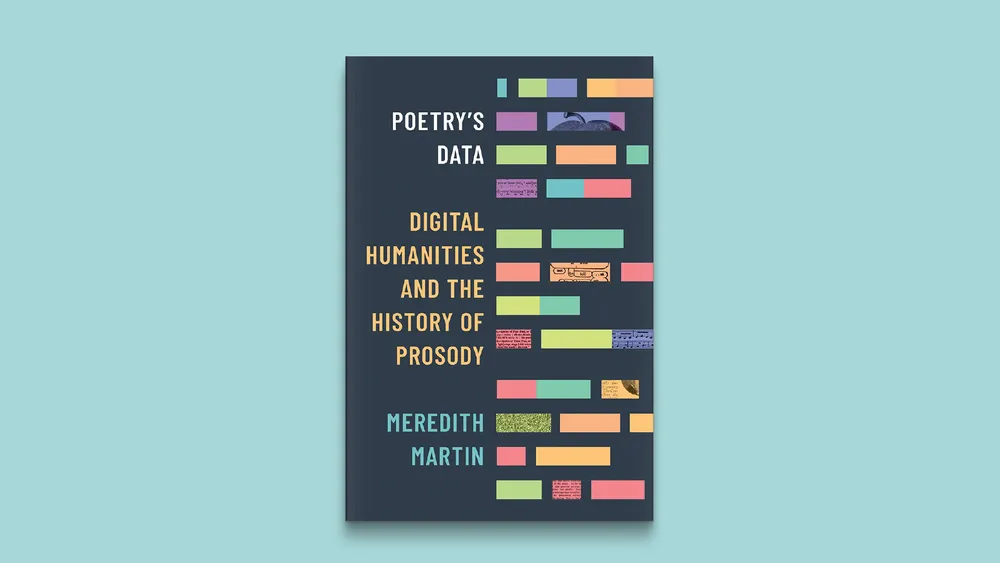Meredith Martin publishes Poetry’s Data: Digital Humanities and the History of Prosody
8 September 2025
Why literary studies must confront digital mediation

We are excited to announce the publication of CDH Faculty Director Meredith Martin’s new book: Poetry’s Data: Digital Humanities and the History of Prosody (Princeton University Press, 2025).
Martin’s book explores the intersections between two histories: the history of prosody in English and the history of digital humanities. As Martin shows, the link between these two narratives is, appropriately, “poetry’s data,” information that illuminates the changing definitions of poetry, its sounds, linguistic elements, and more.
To tell these stories, Martin explains how the Princeton Prosody Archive (PPA), a web application that would become the CDH’s flagship project—and, in turn, the Center for Digital Humanities itself—emerged from her research on meter.
“Poetry's Data is a love letter to the CDH,” Martin explained. “It narrates how the CDH was born —out of the sense that humanities scholars deserved more respect and more infrastructure for their work in the modern information age.”
Martin writes that to understand the history of prosody—what scholars think makes poetry poetry—she needed an archive of materials. In collaborating to build a digital database of these materials, Martin produced, unearthed, analyzed, and argued from data, and in doing so learned about not only the history of prosody but also the way we access that history.
“Poetry’s data is also metadata—how we find information about poems,” Martin writes, “and it involves the transformations of a variety of formats into data so that we can find (or fail to find) poems in a digital environment” (10).
The concept of mediation looms large in Martin’s work. Of course, researchers, like many readers, read poems—and writing about poems—online. Moreover, technological advancements have led to new ways of doing the work of research. Databases like the PPA bring together sources that might be separated by old classifications (changing definitions of literary vs. non-literary works, for example), but they too produce their own kinds of categories—in some cases determined by the corporations who own them.
“Because we live and research in this technologically mediated landscape, our old models of reading and researching—methods that presume an autonomous, single scholar gathering resources and making claims—no longer hold,” Martin argues. “We need to theorize both the embeddedness of our sources inside multiple layers of mediation and how we are situated inside an information ecosystem that demands our active participation” (3–4).
As Martin explains, the new models of reading and research reveal that collaboration, interdisciplinarity, and behind-the-scenes work are critical to the project of research. Accordingly, each chapter of the book includes the title of one or two of the PPA’s “Collections” in brackets. Titles such as “How We Classify [Linguistic]” and “How We Argue [Original Bibliography]” reinforce the connection between Martin’s work as the author of a monograph, a widely accepted form of scholarship, and the collaborative work of building the PPA and the CDH, which supports researchers in creating exciting but often unacknowledged scholarly interventions.
“When humanities scholars do not cite or acknowledge the databases in which they encounter a digitized historical page (citing, instead, its print form in an archive they have never visited),” Martin explained, “they invisibilize the scholarly labor of turning that page into data; similarly, we do not acknowledge the scholarly interventions of creating digital scholarly sources in our outdated structures of tenure and promotion.”
Similarly, Martin notes that her involvement with the Historical Poetics reading group—the participants in which do not all identify as digital humanitists—and her contributions to building the PPA and CDH run parallel to each other both chronologically and thematically.
“Just as I don’t believe we can navigate the new information environment as literary critics and believe we are in any way alone, so too did I learn that I am able to come to understand the material mediations of nineteenth-century poetry only with a group of devoted colleagues” (16).
These values continue to inform Martin’s projects. In addition to directing the CDH, Martin is at work on two co-authored books: Data Work in the Humanities, with former CDH postdoctoral associate and Weld Fellow Zoe LeBlanc, now assistant professor in the School of Information Sciences at the University of Illinois Urbana-Champaign; and Walled Gardens, with CDH Project Manager Mary Naydan and Lead RSE Rebecca Sutton Koeser. She also serves as co-PI on the PLI-funded “Exercises in Literary Style” project with Associate Research Scholar and Perkins Fellow Wouter Haverals.
“I could not have helped to create the PPA without everyone past and present at the CDH,” Martin explained, “and I could not have argued in Poetry's Data that modern humanities research is fundamentally collaborative, and that we need to re-conceive it as such, without learning this first-hand from and with these same colleagues.”